Boost MCCQE1 Results with Time Management Tips

We have all heard the familiar phrase “Time is money.” For medical graduates preparing for the MCCQE1 exam right here in Canada. This saying takes on a whole new level of importance.
The truth is, success in this exam hinges on how you manage your time. Each correctly answered question translates into a higher score and an outstanding MCCQE1 result, which gives you an edge. It is a voice that says, “I AM READY.”
But how can one properly manage time in a challenging exam like MCCQE1? In this post, I will explain how the exam is scored. Why is effective time management vital for achieving a high score? And practical strategies you can use to improve your time management while preparing for and taking the exam. I will also cover the role of Ace QBank in improving your time management skills. Finally, I will wrap up with common mistakes to avoid on the MCCQE1.
How Is the MCCQE1 Exam Scored?
Understanding how the MCCQE1 exam is scored marks the very first step in your preparation. And let’s be honest, it can make or break your test strategy. The format and scoring system pack a powerful punch. They shape exactly how you will need to pace yourself when the clock starts ticking.
With the recent updates introduced for 2025. It is essential to grasp these changes to develop an effective strategy that maximizes your performance.
The MCCQE1 remains a two-part exam. What has changed is that both sections now consist entirely of multiple choice questions (MCQs). This might seem like a small adjustment. But it significantly impacts how candidates approach each part.
Multiple-choice questions demand not only medical knowledge. But also strategic thinking and efficient time management.
Each part contains many questions (typically around 230 in total) covering various topics. For each question, you are allotted just over one minute on average. At first glance this might seem sufficient.
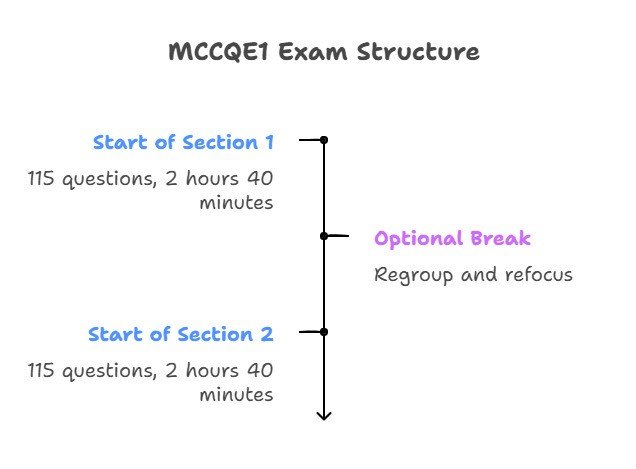
However, maintaining a steady pace throughout the exam. Proves challenging for most candidates. Time management isn’t just about answering questions quickly. It is about allocating your time wisely across the entire exam. This ensures you answer as many questions as possible.
One common misconception among examinees is that speed equals success. In reality, rushing through questions increases the likelihood of mistakes. Or leaving questions unanswered altogether. The key lies in balancing accuracy with efficiency. This is something we will discuss in more detail later on.
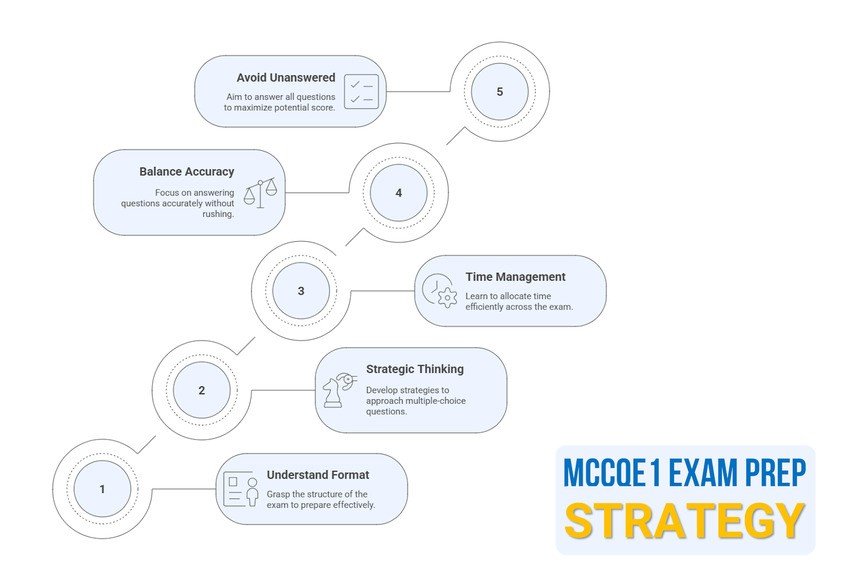
The other thing I wanted to highlight here. It is important to understand what happens if you run out of time. And fail to answer all questions within the allocated period.
Unlike some exams, where unanswered questions are penalized with negative marking. A deduction from your score. The MCCQE1 does not impose such penalties. Instead, unanswered questions simply do not contribute any points toward your final score.
This might sound like good news. After all, you don’t lose score for just leaving a question blank. But if you dig a little deeper and there’s a real risk lurking beneath the surface. Every unanswered question is a missed shot at picking up those valuable scores. The ones that could bump up your overall score when it matters most.
The reality is that unanswered questions become dead weight on your final result. The higher the number of them, the more likely it is that one has to retake the exam.
Why Time Management is Vital for a High MCCQE1 Score?
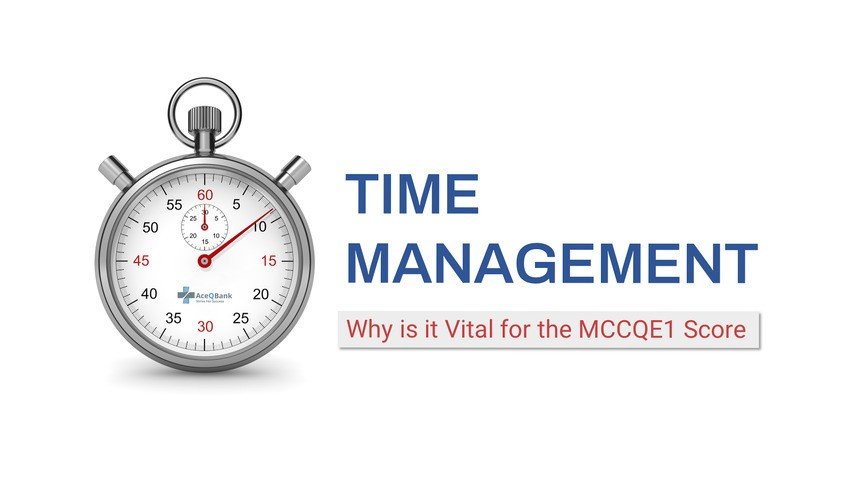
Imagine you are sitting in the Prometric Centre. Halfway through your MCCQE1 exam. You can feel your heart pounding in your chest as you watch the clock mercilessly tick away the minutes.
It is a feeling all too familiar to many medical graduates. That frantic scramble to answer questions as time seems to slip through your fingers. The pressure mounts with each passing moment and suddenly. Even the most straightforward questions can feel like insurmountable challenges.
You see, time management during the MCCQE part 1 isn’t just some “soft skill” they mention in passing. It is the very backbone of your exam success.
Let’s talk about the elephant in the room. In the intensity of exam day. Time isn’t just a ticking clock. It is the silent force shaping your outcome. If there’s one thing that trips up even the brightest candidate during the exam, it’s this. Submitting the exam with too many questions unread.
It is a pattern you see time and again and let’s not sugar-coat it. The more questions you leave behind, the more likely you are to face that exam all over again. Nobody wants that déjà vu!!
Here’s what stings, troubles with timing rarely fix themselves. If you struggled to keep pace the first time. Odds are, you will make the same mistake on your second go. Why? Because during the exam, you are the one in control. You decide when to move on. No one’s going to tap you on the shoulder and say, “Time’s up, bud.”
It often comes down to knowledge gaps or missed clinical clues on the exam day. They breed indecision, the urge to double back and to re-read. They are the reason for you to second-guess yourself. Suddenly, you are stuck in a loop. Reading the same question while the clock ticks on like a winter windstorm in Halifax.
Those clinical clues aren’t there by accident. They are sprinkled throughout the questions for a reason. To help you piece together the clinical puzzle and make a sound clinical decision. But if you overlook a key detail or aren’t sure why it matters, the question will feel vague and disconnected.
On the exam day, the pressure is real and every score counts. That need for certainty leads many to spend way too long on one question. Hoping the answer will magically appear. But unless you address what’s missing, whether it’s knowledge or focus. You will find yourself stuck in that same rut again and again.
Another key player here is recalling the key points. As you read the question and identify clinical clues. So you could piece the puzzle together.
Recalling key points, critical values and therapeutic thresholds will help you see the whole picture. The faster you recall, the faster you make your sound clinical decision.
Both consolidation during sleep and active retrieval practice improve recall of key points. Therefore, both play a role in managing your time during the exam.
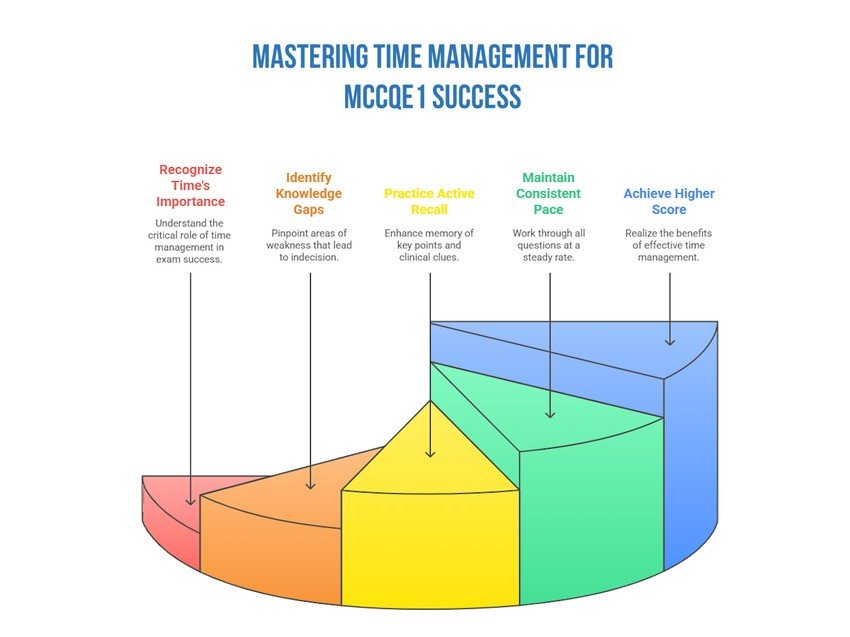
That said, you can clearly see that there is a direct link between effective time management and achieving a high score. In fact, candidates who have mastered the art of pacing themselves. Routinely outperform their peers. Sometimes scoring up to 15% higher on major medical licensing exams.
So, what’s their secret? It is not rushing through the exam. It is being strategic. Having a strategy that allows every question on the exam to receive your full attention.
You should be able to work through all 210 questions at the same pace. From question number 1 to question number 210.
Tips to Improve Time Management and Boost MCCQE1 Result

When it comes to conquering the MCCQE1 exam. Strategic time management is essential. Success isn’t simply about the volume of content you absorb. But about harnessing evidence-based approaches that optimize how you learn and retain information.
Talk to folks who have come out on top, and they will tell you straight up. This exam is a test of stamina. It is a real grind, like a marathon. It demands your sharpest thinking and your absolute best. Right from the first question to the last.
Sure, knowing the material is vital. But that is just the starting block. The rest is all about staying locked in. Keeping your head clear and not letting the nerves rattle you when it matters most.
That’s what really gets you through no two ways about it. The question is, how do you ensure that every minute you spend studying pays off? The answer is to study smarter, not just harder.
In other words, mastering the objectives set by the Medical Council of Canada (MCC) smartly. Using proven methods to optimize how you learn and retain information. Did I strike your curiosity?
Let’s walk through, top three practical strategies that you can put into practice immediately. For more effective study sessions and, ultimately, greater exam success.
1. Unlocking the Power of Memory Consolidation
We often underestimate sleep in the marathon to exam day. But science tells a different story. Sleep is a neurological powerhouse. Especially when it comes to memory consolidation.
This process, where your brain stabilizes and integrates new knowledge into long-term storage, is supercharged during post-learning sleep.
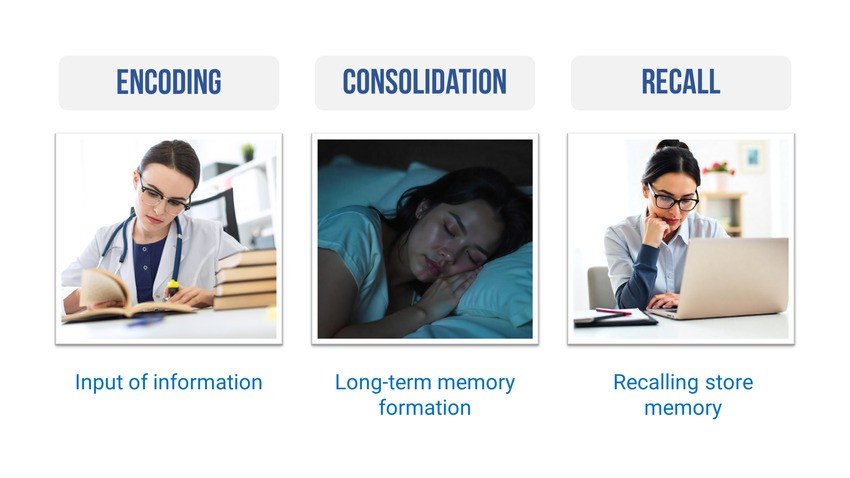
One compelling body of research shows that a good night’s sleep after studying. Doesn’t just rest your body. It actively protects new memories from interference and strengthens their neural traces. Making them more durable and retrievable later.
But here’s the twist. It is not only sleep that matters. Studies highlight that periods of quiet, wakeful rest immediately after learning (think of relaxing with your eyes closed or gentle meditation). Also promotes memory consolidation.
During this downtime, your brain is afforded a window to process, sort and stabilize new information. Without the “interference” that comes with diving straight into another task.
For your exam preparation. Integrating these brief periods of focused rest after studying is a critical tactic. as it can significantly improve memory retention months later. Making it easier to recall key points when you need them most.
2. Mastering Active Recall and Spaced Repetition
Now, let’s turn our attention to two of the most effective. Research supported study techniques you can deploy:
- active recall
- spaced repetition
Traditional reviewing, think passively rereading your notes. It isn’t nearly as effective as active recall. Which challenges you to retrieve information from memory.
This method has been linked to significantly improved exam scores. The act of “pulling” knowledge from your mind strengthens memory traces. It strengthens neural connections and enhances long-term retention.
However, this involves regular practice with high-yield questions. Preferably, questions that are based on the objectives set by the Medical Council of Canada (MCC).
Besides, regularly testing yourself with these types of questions can really help. It allows you to properly cover the MCC objectives. Along with pinpointing areas where you need more practice.
On the other hand, you need to repeat what you learn regularly. Therefore, the best is to combine active recall with spaced repetition. Needless to say, this approach reinforces the neural pathway with each retrieval.
That’s because, using spaced repetition, you plan reviews to happen. Right when you start to forget. Platforms like Ace QBank make applying this strategy straightforward and scalable. The question bank allows you to create a custom question block. A question block that targets specific topics you need to focus on.
Ultimately, using active recall in concert with spaced intervals is a neurologically validated way to encode and maintain key information over the many months of your preparation.
3. Controlling Neurochemical Impact on Memory
Here’s where preparation intersects with the realities of stress and emotion. Both are unavoidable components of high-stakes exams.
Memory formation isn’t just a matter of routine. It is significantly influenced by neurochemicals like cortisol and epinephrine that surge during periods of stress. Moderate levels of these hormones can actually enhance memory encoding by activating the amygdala. Thereby strengthening the memory trace.
To be honest, the effect of stress is complex and unpredictable. Low to moderate arousal boosts focus and retention. But a high level of stress is what is concerning and can backfire by impairing memory formation and retrieval.
Exactly what you don’t want in the run-up to the MCCQE1. So, avoid things or activities that increase stress unnecessarily. Instead, focus on maintaining calm before the exam. We will discuss more about activities that increase stress in the upcoming sections.
How to Leverage Ace QBank to Master Time Management?

Ace QBank is a leading Canadian question bank designed specifically for preparing for the MCCQE1 exam. A crucial test for medical graduates to obtain a medical license to practice in Canada.
It is a comprehensive and highly effective Qbank that supports exam success. Through a combination of over 2800 high-yield questions and evidence-based medicine explanations tailored to the Medical Council of Canada objectives.
This alignment to the MCC objectives ensures comprehensive coverage of what candidates need to know.
On the other hand, the four key features of Ace QBank help them hone their time management skills. Here is the list of those features:
- Two Distinct Study Modes
- Comprehensive Explanations
- Memory Aids
- Self-Assessment
1. Two Distinct Study Modes
The question bank offers two study modes. Each serves a different purpose:
- Time Mode simulates exam-day conditions. Sharpening pacing and test-taking skills under pressure. To help candidates better manage the actual exam’s timed environment.
- Tutor Mode allows self-paced study with guided explanations. Helping candidates master challenging topics at their own speed. Robust comprehension of the medical concepts increases the speed of analyzing questions.
2. Comprehensive Explanations
Every question is thought-provoking and accompanied by evidence-based medicine explanations. Covering why the correct answer is right and why other options are incorrect. This approach deepens understanding instead of rote memorization.
Also, for those preparing for the MCCQE part 1 exam. Having access to detailed evidence-based medicine (EBM) explanations is invaluable. These explanations clarify the core principles of clinical decision-making grounded in current Canadian guidelines.
Since MCCQE1 emphasizes diagnosis, management and medical decision making through multiple-choice questions. Integrating EBM rationales helps candidates develop critical thinking skills and apply best practices confidently under exam conditions.
Furthermore, the Integration of EBM will give candidates a robust comprehension of the medical concepts, which translates to an increase in their speed of analyzing questions and accuracy of answering them.
3. Memory Aids
Mnemonics and visual aids enhance memory retention. They do this by transforming complex information into easily recallable formats. which is crucial given the volume and difficulty of medical content.
Meanwhile, algorithms offer clear, organized frameworks that help students synthesize vast clinical knowledge and understand critical decision-making processes.
Together, these tools deepen conceptual understanding and maximize learning efficiency. This improves candidates’ ability to apply knowledge in clinical scenarios during the exam.
Moreover, the use of these integrated memory aids in the question bank supports efficient exam preparation and improves time management. Two critical factors for success in the MCCQE1 exam.
That’s because of the organized presentation of information through algorithms. Accelerates the clinical reasoning skills of candidates. helping them navigate complex questions effectively under timed conditions.
On the other hands, questions that are enhanced by mnemonics, tables and illustrations. Reinforce long-term retention and reduce the exam anxiety of candidates.
Ultimately, these enhancements foster a more active learning experience. Which translates into better MCCQE1 exam results.
4. Self-Assessment
The self-assessments that simulate the actual exam are essential for medical students preparing for this high-stakes licensing exam.
These self-assessments provide a true simulation of the exam difficulty and timing. Allowing candidates to experience the real test environment beforehand.
Helps them to put their time management skills to the test. Enabling them to pace themselves and complete all questions within the allotted time.
Furthermore, the assessments are meticulously designed to cover high-yield MCC objectives. ensuring that candidates focus on essential knowledge areas and clinical decision-making scenarios akin to what they’ll face on exam day.
However, Ace QBank has taken this to another level by including completely distinct questions in the assessment. The questions in the self-assessments differ from those in the MCCQE1 question bank. This is to accurately measure the readiness of candidates.
Beyond preparation, these self-assessments reduce exam anxiety and boost the confidence of candidates. Shifting their mindset from “I hope I pass” to “I have prepared thoroughly.”
In addition, detailed explanations for each question. Allow candidates to identify their strengths and weaknesses precisely. Enabling targeted study and efficient use of their time on the exam day.

This not only elevates the likelihood of passing the exam on the first attempt. It also gives them a chance to turn their weaknesses into strengths before the actual exam.
To effectively master time management using Ace QBank. I recommend a focused and disciplined approach that leverages its four core features. First, utilize the two distinct study modes strategically.
Use Time Mode regularly to simulate exam conditions and develop pacing skills essential for completing the MCCQE1 within the allotted time. Complement this with Tutor Mode to deepen your understanding of challenging topics at your own pace. Which will ultimately improve your speed in analyzing questions.
Second, engage thoroughly with the comprehensive evidence-based explanations provided for each question. This will strengthen your clinical reasoning and reduce guesswork during the exam.
Third, take advantage of the self-assessment. These assessments help you refine your timing strategies at the very least.
This is how you can optimize both your content mastery and time management skills. Also, positioning yourself for success on the MCCQE1.
How can I try Ace QBank Demo Questions?
For trying the MCCQE part 1 sample questions. Begin by navigating to the official MCCQE1 Qbank website.
Here you will find a prominently displayed “Try Free DEMO” button right on the home page. This is your entry point. Simply click on it and you will be directed to the sign up page.
The process is straightforward. Create your account by filling in the required details. You will soon get a confirmation email. After that, your account will be activated.
Once your account is active. You will be granted five days of complimentary access to the MCCQE Part 1 sample questions.
During this period, you can explore the platform’s interface. Navigate through the different study modes. And truly experience the range and depth of the content on offer.
This trial is not just an opportunity to familiarize yourself with the platform. But also a chance to assess whether the question bank aligns with your study needs and expectations.
5 Common Mistakes to Avoid Before MCCQE1
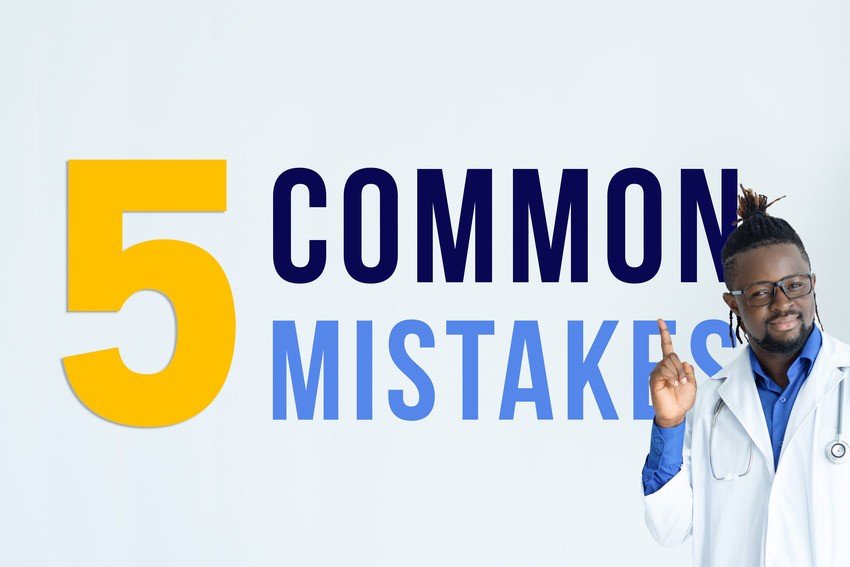
We all want to believe in success on the exam. Comes down to how well we have mastered the objectives.
But if you talk to people who have taken the test. You will hear this over and over. It is the avoidable mistakes. The simple things that end up costing us the most.
Let’s talk about five of the most common pitfalls that candidates make. They are easy to avoid. If you know what to look for. But they can completely throw you off your game if you’re not careful. Here is the list:
- Arriving Late at Prometric Centre
- Unfamiliarity with the Interface
- Lack of Proper Sleep
- The Illusion of Passive Learning
- The “I’ll Just Wing It” Approach to a Study Plan
- Arriving Late at Prometric Centre
You’d think everyone would plan ahead for exam day. But nerves and overconfidence make it surprisingly easy to cut it close.
Even a small delay. A traffic jam on the 401, an unexpected TTC delay or a misread email about the start time. It can leave you racing to your seat, heart pounding.
When you start your day in a panic. Your body pumps out stress hormones like cortisol. It is not just about being flustered. It actually gets in the way of your brain working at its best. You lose those calm, steady nerves you need for critical thinking and recall.
Bottom line is that arriving late. It will leave you frazzled and struggling to focus for the first hour. Therefore, give yourself more time than you think you need. Plan your route. Try to arrive at a Prometric Centre at least 30 minutes early.
so, nothing can shake your sense of control.
- Unfamiliarity with the Interface
No one wants their first encounter with the exam platform to be on test day. Yet so many candidates skip the practice tutorial thinking “How hard can it be?”
The reality is that struggling with the interface. Whether it is figuring out how to flag a question or even just navigating between screens. It can be maddening when every minute counts.
You might lose an average of 7-10 minutes just orienting yourself. Because unfamiliar with the exam interface. That’s the time you need for careful thinking. Not troubleshooting technology.
Take advantage of the official tutorial before exam day. Get comfortable with the layout and control panel. You want your brain fully focused on clinical decisions. Not on finding the “next” button.
- Lack of Proper Sleep
Here’s where I get passionate. Pulling an all nighter isn’t heroic. In fact, it is quite the opposite. If there’s one mistake that can silently sabotage your performance. It is sleep deprivation.
Sleeping well removes metabolic waste that accumulates in the cerebrospinal fluid (CSF) during the day. Without enough sleep, CSF clearance slows down. Causing your brain to feel foggy.
The worst part is that lack of sleep does more than make you groggy. It significantly elevates your cortisol levels the “stress hormone” and impairs your ability to think clearly. High cortisol narrows your focus, clouds your judgment and can even intensify feelings of panic in stressful moments.
So don’t let pre-exam worry rob you of sleep. Make sleep non-negotiable in your prep plan. Your brain will thank you.
- The Illusion of Passive Learning
Don’t fall into the trap of just reading and highlighting textbooks. The passive learning is one of the least effective ways to prepare for a high-stakes test like this. You need to be actively engaged with the material. True preparation demands active engagement.
Make active recall your best friend. Test yourself constantly. Use Canadian question banks tailored to the MCC objectives. Ace QBank is a favourite for many.
Don’t just answer the questions. Dig into why the right answer is right and, just as importantly, why the wrong ones don’t fit.
The more you challenge your brain to retrieve information. The stronger those neural connections become. Setting you up for genuine mastery.
- The “I’ll Just Wing It” Approach to a Study Plan
It is tempting to just grab a book and start reading. But don’t make the mistake of thinking the exam covers only a few topics. There is far too much to cover for you to take a random approach. You need a good study plan if you want to succeed.
Treat your study plan like a prescription. Be specific and intentional. Start by using the MCC’s objectives. They are your roadmap. Then break down the topics into manageable chunks and assign them to specific days and weeks.
This isn’t just about creating a schedule. It is about creating a system that ensures you cover all your bases. If you do the work up front to organize. You will never find yourself staring at unfamiliar questions. Wishing you’d had a plan.
No kidding, these five mistakes seem like no-brainers. Yet, you’d be surprised by how many candidates have found themselves back at square one. Have to retake the exam.
Key Takeaways
Mastering Time Management is Vital for the MCCQE1 Exam Success. The exam demands not just medical knowledge but strategic pacing. Each question has about one minute and balancing speed with accuracy is essential. Leaving questions unanswered means lost opportunities for points. So, managing your time wisely can boost your score significantly.
Effective Study Techniques Enhance Time Management. Combining active recall with spaced repetition strengthens memory and speeds up clinical decision making. Using Qbank like Ace QBank helps simulate real exam conditions. Reinforcing knowledge and improving your ability to answer questions efficiently.
Ace QBank Is the Best for the MCCQE1 Exam Preparation. The question bank features time mode & tutor mode. Evidence-based medicine explanations. Along with memory aids and self-assessments to help you build your knowledge. And also sharpen pacing under exam conditions. This focused practice helps you finish all questions on time during the exam.



